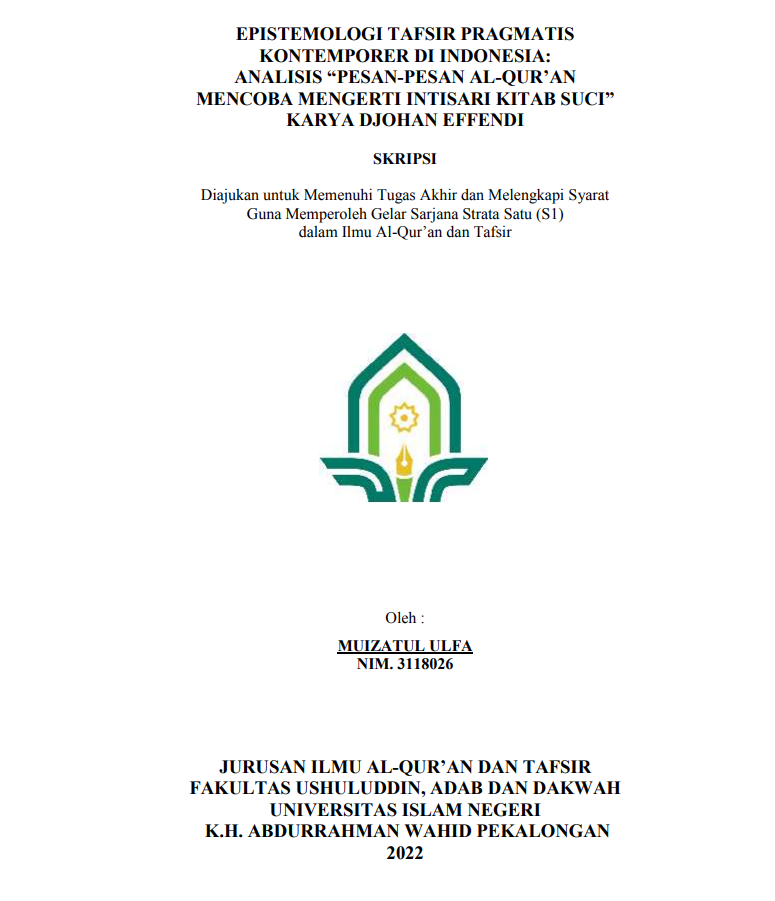
SKRIPSI IAT
Epistemologi Tafsir Pragmatis Kontemporer di Indonesia : Analisis "Pesan-Pesan Al Qur'an Mencoba Mengerti Intisari Kitab Suci" Karya Djohan Effendi
The emergence of this pragmatic interpretation is methodologically problematic. Due to the pragmatism of Djohan Effendi's interpretation of “Pesan- Pesan Al-Qur’an Mencoba Mengerti Intisari Kitab Suci” by Djohan Effendi the tendency is thematic but not comprehensive, leaving out the redactions of the original verses, and leaving referring directly to references from commentary books. Therefore, the focus of the study in this paper is how is the pragmatism of the interpretation of “Pesan-Pesan Al-Qur’an Mencoba Mengerti Intisari Kitab Suci” by Djohan Effendi, and what is the epistemology of pragmatism of interpretation by Djohan Effendi. With a view toexamines Djohan Effendi's “Pesan-Pesan Al-Qur’an Mencoba Mengerti Intisari Kitab Suci”, reveals a portrait of his intellectual life, what are the characteristics of his interpretation, what is the pragmatic side of Djohan's work, and what is the epistemology of pragmatism of interpretation “Pesan-Pesan Al-Qur’an Mencoba Mengerti Intisari Kitab Suci” by Djohan Effendi. The method used is Abdul Mustaqim's contemporary interpretation epistemology theory to analyze what the epistemology of Djohan's work is, and the pragmatism interpretation method to analyze the pragmatic aspects of the work. From this, it can be concluded that Djohan Effendi is an intellectual and Islamic thinker from Banjarmasin, who is also very enthusiastic about the interpretation of the Koran. The interpretation contained in his work uses beautiful literary language. The work uses the form of bil ra'yi interpretation with ijmali and maudu'i presentation methods, has an adab ijtima'i interpretation style, by prioritizing universal and substantial values. At the end of each interpretation of the surah al-Qur'an there are qur'aniy poems, and poetic translations of Surah al- Fatihah and Juz 'Amma. It is called pragmatic because it is deepthe presentation of the interpretation leaves the ideal of a work of interpretation, the presentation is thematic but not comprehensive, leaves out the verses of the Koran, does not refer to direct references to the interpretation, and the delivery of the interpretation tends to be narrative. However, for commentary works that are usually in volumes, Djohan's work could be the right choicefor readers who want to understand the messages in the Qur'an and don't want to mess around with long explanations and analysis. Regardless of the advantages and disadvantages, as partcreationfrom the treasures of Indonesian interpretation, this work deserves appreciation.
Ketersediaan
| 23SK2331023.00 | SK IAT 23.023 ULF e | My Library (Lantai 3, Local Content) | Tersedia |
Informasi Detail
- Judul Seri
-
-
- No. Panggil
-
SK IAT 23.023 ULF e
- Penerbit
- Pekalongan : Jurusan S-1 Ilmu Al-Qur\'an dan Tafsir FUAD UIN K.H. Abdurrahman Wahid Pekalongan., 2023
- Deskripsi Fisik
-
xiv, 96 hlm., 30 cm; Bibliografi: 97-102
- Bahasa
-
Inggris
- ISBN/ISSN
-
-
- Klasifikasi
-
2X1.12
- Tipe Isi
-
-
- Tipe Media
-
-
- Tipe Pembawa
-
-
- Edisi
-
-
- Subjek
- Info Detail Spesifik
-
-
- Pernyataan Tanggungjawab
-
Muizatul Ulfa (3118026)
Versi lain/terkait
Tidak tersedia versi lain
Lampiran Berkas
Komentar
Anda harus login sebelum memberikan komentar
 Karya Umum
Karya Umum  Filsafat
Filsafat  Agama
Agama  Ilmu-ilmu Sosial
Ilmu-ilmu Sosial  Bahasa
Bahasa  Ilmu-ilmu Murni
Ilmu-ilmu Murni  Ilmu-ilmu Terapan
Ilmu-ilmu Terapan  Kesenian, Hiburan, dan Olahraga
Kesenian, Hiburan, dan Olahraga  Kesusastraan
Kesusastraan  Geografi dan Sejarah
Geografi dan Sejarah